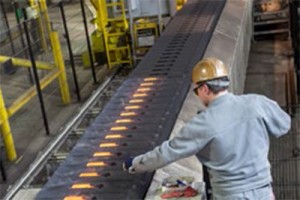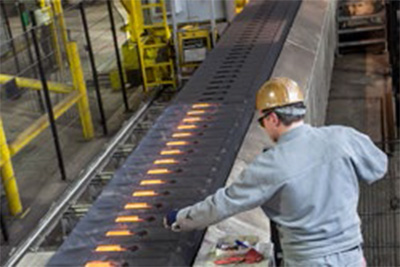 Engineers in Germany are working on a new steel hardening process that they claim holds promise for the development of downsized car engines. The team, from the Karlsruhe Institute of Technology (KIT) is working on a new process for the case-hardening of steel that could oneday help a range of automotive components deal with the rigours of downsizing. In an effort to save energy, weight and reduce emissions, manufacturers are increasingly looking at the development of smaller engines with the same or even increased power. Thanks to their reduced cylinder capacity these engines consume less fuel, however this downsizing can often put higher mechanical and thermal loads on key engine components. One particular area of concern is in diesel injection systems, which have to be made from exceptionally stable materials in order to achieve higher injection pressures and improved injection accuracies. Headed by David Koch the team has been developing a process now as low-pressure carbonitration in which, at temperatures between 800 and 1050°C and total pressures below 50 millibars, the surface of the components to be hardened is enriched with carbon and nitrogen and subsequently hardened by quenching.So far, low-pressure carbonitration has been carried out nearly exclusively using ammonia as a nitrogen donor together with a carbon donor, i.e. ethyne (acetylene) or propane. The KIT scientists are working with researchers at Robert Bosch in studying a range of different gases and gas mixture that could be used for the process, and hope to transfer the process from the laboratory to the pilot scale.
Engineers in Germany are working on a new steel hardening process that they claim holds promise for the development of downsized car engines. The team, from the Karlsruhe Institute of Technology (KIT) is working on a new process for the case-hardening of steel that could oneday help a range of automotive components deal with the rigours of downsizing. In an effort to save energy, weight and reduce emissions, manufacturers are increasingly looking at the development of smaller engines with the same or even increased power. Thanks to their reduced cylinder capacity these engines consume less fuel, however this downsizing can often put higher mechanical and thermal loads on key engine components. One particular area of concern is in diesel injection systems, which have to be made from exceptionally stable materials in order to achieve higher injection pressures and improved injection accuracies. Headed by David Koch the team has been developing a process now as low-pressure carbonitration in which, at temperatures between 800 and 1050°C and total pressures below 50 millibars, the surface of the components to be hardened is enriched with carbon and nitrogen and subsequently hardened by quenching.So far, low-pressure carbonitration has been carried out nearly exclusively using ammonia as a nitrogen donor together with a carbon donor, i.e. ethyne (acetylene) or propane. The KIT scientists are working with researchers at Robert Bosch in studying a range of different gases and gas mixture that could be used for the process, and hope to transfer the process from the laboratory to the pilot scale.
New Steel Hardening Process For Downsized Car Engines

